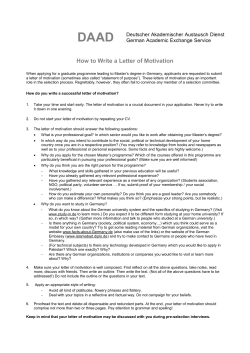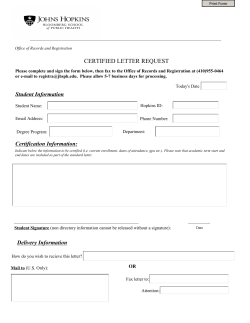
How to Apply
How to Apply Applying at a university can be challenging. The following document is meant to guide applicants through the application and selection process for the Liberal Arts and Sciences (B.A./B.Sc.) program. It also provides links to further information and to the relevant forms. 1. Application The application process for the Liberal Arts and Sciences (B.A./B.Sc.) program starts at the University’s Study Portal. You can enter it here, and then you will be guided through the procedure of filling out the application form step-by-step. In the end, you will have a printable version of the application form, which you can then put in the post together with the other relevant documents listed below. People with dual nationalities can contact us for advice on how to apply. Aside from the application form itself, all applicants must include the following documents: A certified copy of a German higher education entrance qualification or a non-German higher education entrance qualification certified as equivalent; for details concerning the certification please check here. Information for German citizens with foreign higher education qualification. Information on the recognition of the IB (International Baccalaureate) in Germany. Prof of study-orientation-test (can be handed in at matriculation), we recommend to do the LAS OSA, but you can also choose to do www.was-studiere-ich.de. Certified proof of English proficiency at B2 level or above according to the Common European Framework of Reference for Languages (CEFR). As proof of proficiency, we accept the internationally recognized test instruments TOEFL, IELTS and Cambridge ESOL, converted according to the scale of the University’s Language Institute given here. If you have an English language university entrance qualification (such as British A-levels, or the International Baccalaureate), or if you studied English for at least 8 years in the "Gymnasium" or if English was a major subject (“Leistungskurs”) in your final Abitur examination, you do not need to provide further proof of proficiency. A motivational letter (in English, maximum two pages) that outlines your personal motivation for studying Liberal Arts and Sciences at the University of Freiburg. You can find recommendations concerning the letter of motivation here. Curriculum Vitae (in English) If applicable, supporting documents or attestations for internships and/or time spent abroad. For Non-EU citizens are additional documents required: Officially certified copy of your university entrance examination certificate (and copies of the translation). Officially certified copies of your academic records (and copies of the translation). If you are currently studying or have previously studied at a university, we need your complete academic records (transcripts, reussites, index, etc.). Please submit the documents in the original language as well as an official translation. Officially certified copy of your university degree (and copies of the translation). Depending on your educational and national background, you have to send your application and/or the documents listed above to the following address: Prospective students from Germany or EU-countries: Albert-Ludwigs-Universität Freiburg University College Freiburg Postfach D-79085 Freiburg Prospective students from Non-EU-countries: Albert-Ludwigs-Universität Freiburg Service Center Studium International Admissions and Services Postfach D-79085 Freiburg th The complete application must be received by July 15 (closing date) for the following winter semester. Please note: As starting the Liberal Arts and Sciences program is only possible in October, there is only one yearly application date. 2. Selection Process Step 1: Preliminary Selection The first part of the selection process concentrates on your academic achievements. These are represented by the final grade of the German higher education entrance qualification (“Abitur”) or its equivalent. Certified non-German higher education entrance qualifications are converted according to the guidelines of the German Standing Conference of the Ministers of Education and Cultural Affairs of the Länder (“Kultusministerkonferenz”); for more information please check the University’s Study Portal. All applicants are ranked according to their school leaving grade. Invitations for interviews are sent out based on this ranking. We then interview at least twice the number of people for whom we have places in the program. The admission interviews normally take place in Freiburg between July 29th and August 9th for the following winter semester. Please be ready to take part in the interview during this timeframe, if you do not take part in the interview you will not be admitted. Step 2: Final Selection In the final selection, your over-all school-leaving grade (see above) can be modified by two further criteria: the interview score and, if applicable, other achievements. The result is the “selection score” (the lower the better!). Interviews Interviews are only for EU-Applicants. In the 30 minute interviews, applicants must show that they have the appropriate motivation and aptitude for the Liberal Arts and Sciences program as well as a clear perception of their plans for the future. The members of the interview commission assess the 2 applicants on a scale from 0 to 8 points. The interview is passed if a score of 4 or more points is attained. The interview score is divided by ten and then subtracted from the school-leaving grade. A school-leaving grade of 1.9 and a six point score in the interview would thus, e.g., lead to a selection score of 1.3. Other Achievements Applicants who have (1) done a volunteer service with a social, ecological or developmental focus of at least nine consecutive months, (2) done a military service for at least the same amount of time, or (3) spent at least six consecutive months on a youth exchange program or language course outside of their country of residence during the last three years receive two further points, which are treated as above. The selection score of 1.3 from the example above would thus be improved further to 1.1. Selection Score The result is a selection score according to which applications are again ranked. Following a final decision by the Rector, the acceptance and rejection letters are then sent out by the University’s Registration Office. Places are offered first to the fifty candidates that have the lowest selection scores. Places that are not taken up by successful candidates are then offered to previously rejected applicants according to their ranking (“Nachrückverfahren”). This procedure may take some weeks for candidates lower on the list. You can find the official Admissions regulations here (currently only available in German). 3. Further Information All applicants who are accepted for the LAS program receive their letter of acceptance approximately late August or the beginning of September; the letter also includes further information concerning the enrollment (matriculation). This takes place at the University’s “Student Service Center”, Sedanstr. 6, in Freiburg. You can find general information about enrolling here and here. For enrolment, you must provide proof of having completed a study orientation service. Such a service is provided by the University of Freiburg’s Online Studychoice Assistants (OSA). The OSA for the Liberal Arts and Sciences program is now online: LAS OSA. Links and information to other approved tests can be found here. Alternatively, you can take the test (in German) provided by the Ministry of Science, Research and the Arts: www.was-studiere-ich.de Being a public German university, the University of as well as the University College Freiburg do not charge tuition fees. In most German federal states and at almost all of our top universities even top-level higher education is considered a service the German state provides. Nonetheless, for enrolment you must provide proof that you have paid the registration fee that is charged per semester. More information on Admissions can be found on the University's Studyportal page. After having matriculated at the University’s Registration Office, you will receive all further information for starting the LAS program from the University College Freiburg. 4. Transfer students 3 The Liberal Arts and Sciences program has a limited number of places. Transfer into the program may become possible in very limited numbers only if current students drop out and numbers fall below 70. All LAS students have to cover the courses of the first year foundational training. Transfer students’ transcripts would be checked to see if which first year courses could be recognized. Regardless of their previous major, transfer students would be required to follow one of our majors. We do not encourage transfer while the LAS program is in its first formative years. If you have already been studying at another university and are interested in transferring to UCF, please apply for the first year of LAS. Credit recognition from your previous program could then be discussed at a later point. Please do not hesitate to contact us if any questions arise: University College Freiburg (UCF) University of Freiburg Bertoldstraße 17 D-79085 Freiburg Tel: +49 (0)761/203-67342 Fax: +49 (0)761/203-67358 studyinfo@ucf.uni-freiburg.de www.ucf.uni-freiburg.de 4
© Copyright 2025





















